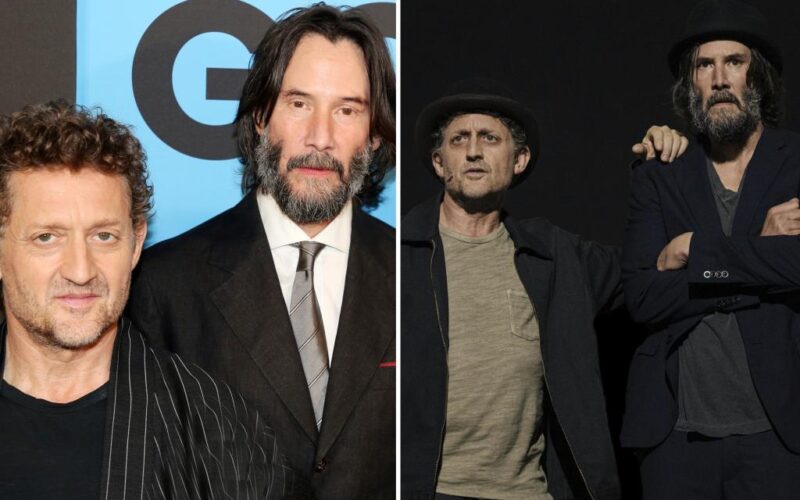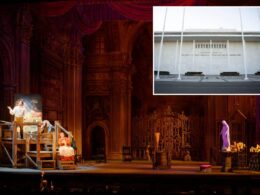Theater review
Waiting for Godot
Running time: Two hours and 15 minutes with one intermission. At the Hudson Theatre, 141 W. 44th Street.
Over at the Hudson Theatre on 44th Street, the crowd is waiting for Neo.
And John Wick. And, of course, Bill and Ted.
In the sense that Keanu Reeves shows up for work at “Waiting for Godot,” the play that opened Sunday night on Broadway, they get what they came for. Celeb spotters will be satisfied that they forked over as much as $670 to bask in the presence of the chosen one.
But, besides the famous faces of Reeves and his “Bill & Ted” co-star Alex Winter, is the audience being treated to a top-tier production of Samuel Beckett’s absurdist tragicomedy?
Is Reeves any good?
Eh, not really. This particularly meandering and stiff “Godot” is hardly an excellent adventure.
Nor, by the way, is it a bogus journey.
It’s, as Bill and Ted would say, most non-triumphant. Mediocre. And the leads, one of whom is way out of his depth, certainly face the music.
The chummy actors play Estragon and Vladimir — a k a Gogo and Didi — two clownish men who live out their repetitive days in a barren wasteland anticipating the arrival of the mysterious Godot.
The show could be about religion, war, politics, the meaninglessness of life or nothing at all. Pick your poison.
The duo’s conversations are eccentrically banal (“What do we do now?” “Wait.” “Yes, but while waiting.”). There’s a musicality to the patter, though, and a lot of humor and darkness for gifted performers to sink their teeth into. With the right casting, the strange, bleak chit-chat can mesmerize and fascinate.
Patrick Stewart and Ian McKellen did just that on Broadway 12 years ago. The British vets were hilarious, touching and haunted in the parts.
Yes, they were popular for “Star Trek” and “Lord of the Rings.” But they also were Iagos and Prosperos. Reeves and Winter, needless to say, did not spend decades with the Royal Shakespeare Company. Remember Keanu in the movie “Much Ado About Nothing”?
As Didi, Winter, who’s become an acclaimed documentary filmmaker in recent years, is the more impressive of the two. He carries around a poignant sadness you wouldn’t expect given his silly body of work. He’s quite moving. And the pair do have a natural rapport.
Reeves, on the other hand, is rough. He doesn’t imbue any of Gogo’s lines with meaning — only speed and breathiness. They’re just memorized words that are read with the investment of stating one’s Social Security Number. The actor relies on a vacant stare that’s money when he’s playing an assassin on the big screen. Not so much in live theater.
The guys race through dialogue like they have a train to catch instead of black SUVs idling outside. Act One is turned into a downer “Who’s On First?”.
“Godot” gets a jolt from the arrival of Brandon J. Dirden’s pompous Pozzo and his (mostly) silent slave Lucky, played by Michael Patrick Thorton.
Dirden is appropriately blowhardy as the whip-wielding master.
And Thornton, great as ever, has carved out a unique niche on Broadway: This is his second time being one of the best aspects of a classic play revival led by an action movie star. He was also in the unforgivably heinous “Macbeth” with Daniel Craig. I’d rather see Thornton above the title.
The other big name here for theater fans is Jamie Lloyd, the British director who’s had recent triumphs with the musicals “Sunset Boulevard” with Nicole Scherzinger and “Evita” starring Rachel Zegler.
But his work on plays, like the tortuous “Romeo and Juliet” in London that managed to sap the charm away from “Spider-Man” actor Tom Holland, is hit and miss.
Acting aside, this is one of Lloyd’s better dramatic efforts. He boldly does away with the typical “Godot” aesthetic of gray emptiness and an ominous tree in the back. Instead, designer Soutra Gilmour’s set is a bright, giant wooden cylinder that looks like something Timothee Chalamet might pilot in “Dune.”
There are none of Lloyd’s usual screens or al fresco adventures, either. Unlike what the director did to Jessica Chastain in “A Doll’s House,” he generally allows Reeves and Winter to actually walk around.
But cool scenery doesn’t go very far when one of the actors on it simply cannot handle Beckett.
The moment that gets the biggest response, actually, has nothing whatsoever to do with the writer or “Waiting for Godot.”
When Didi and Gogo are talking about the old days, Winter and Keanu do the air-guitar move from “Bill & Ted.”
After the audience laughed, I could palpably feel them wishing they were watching that instead.








